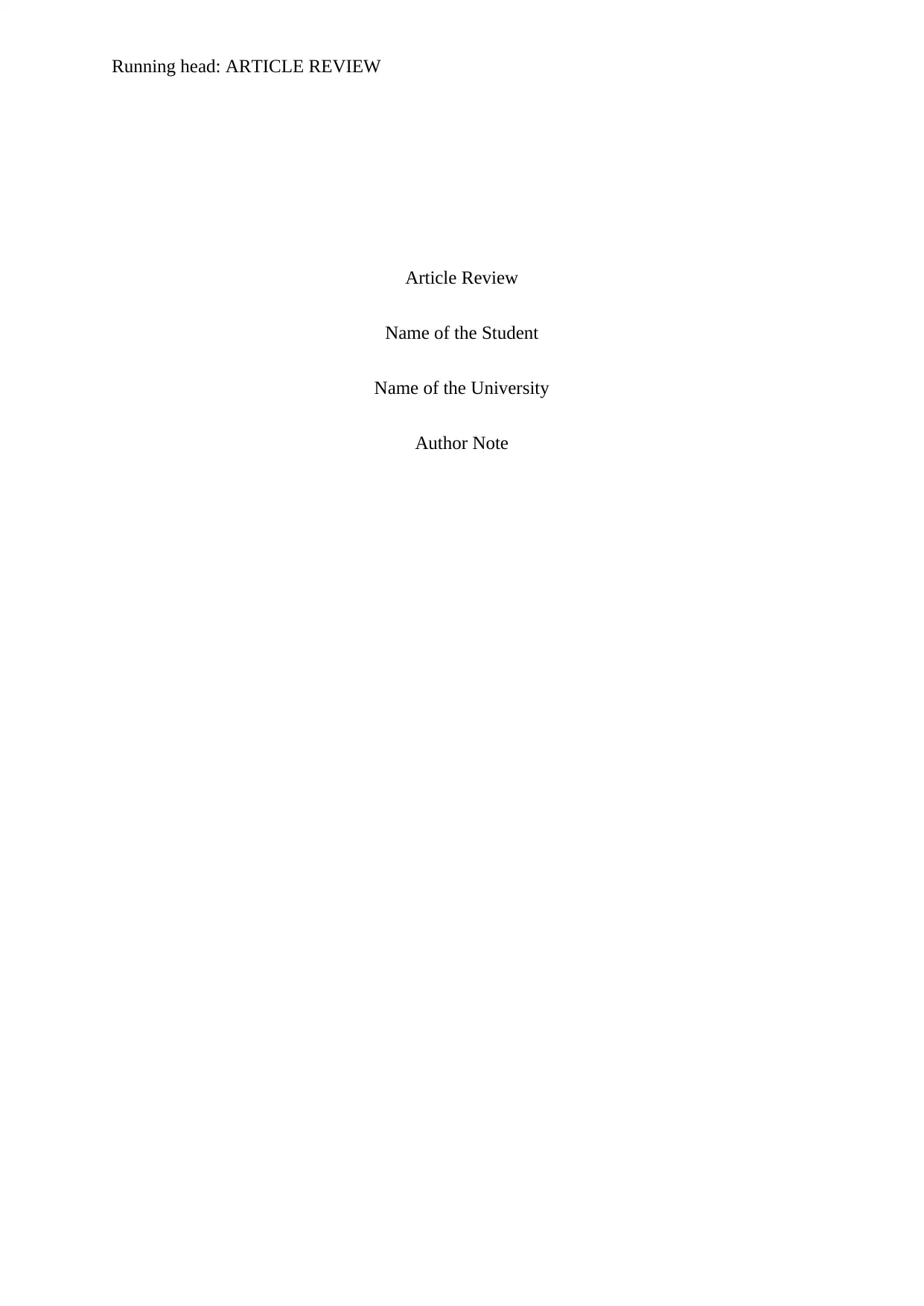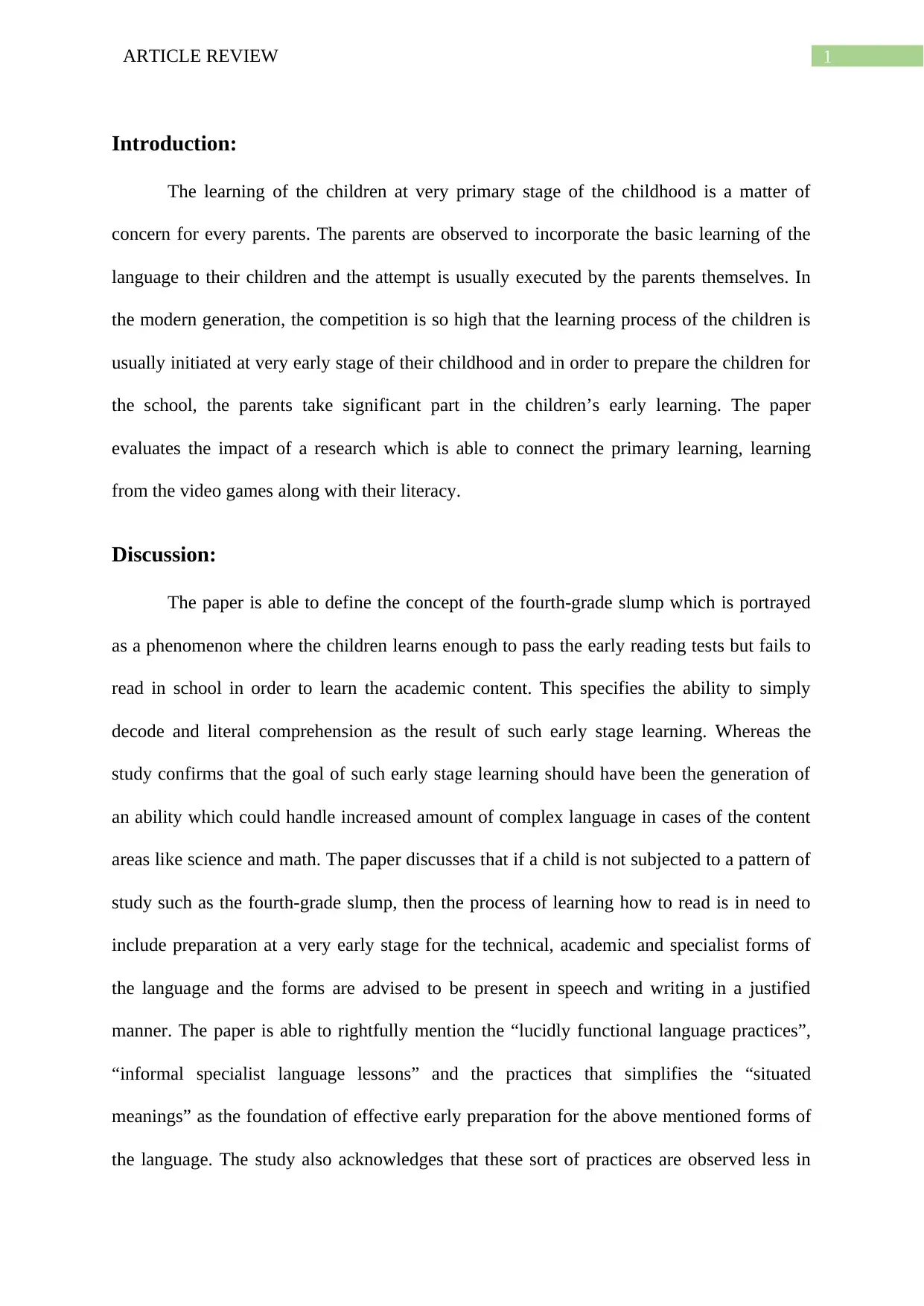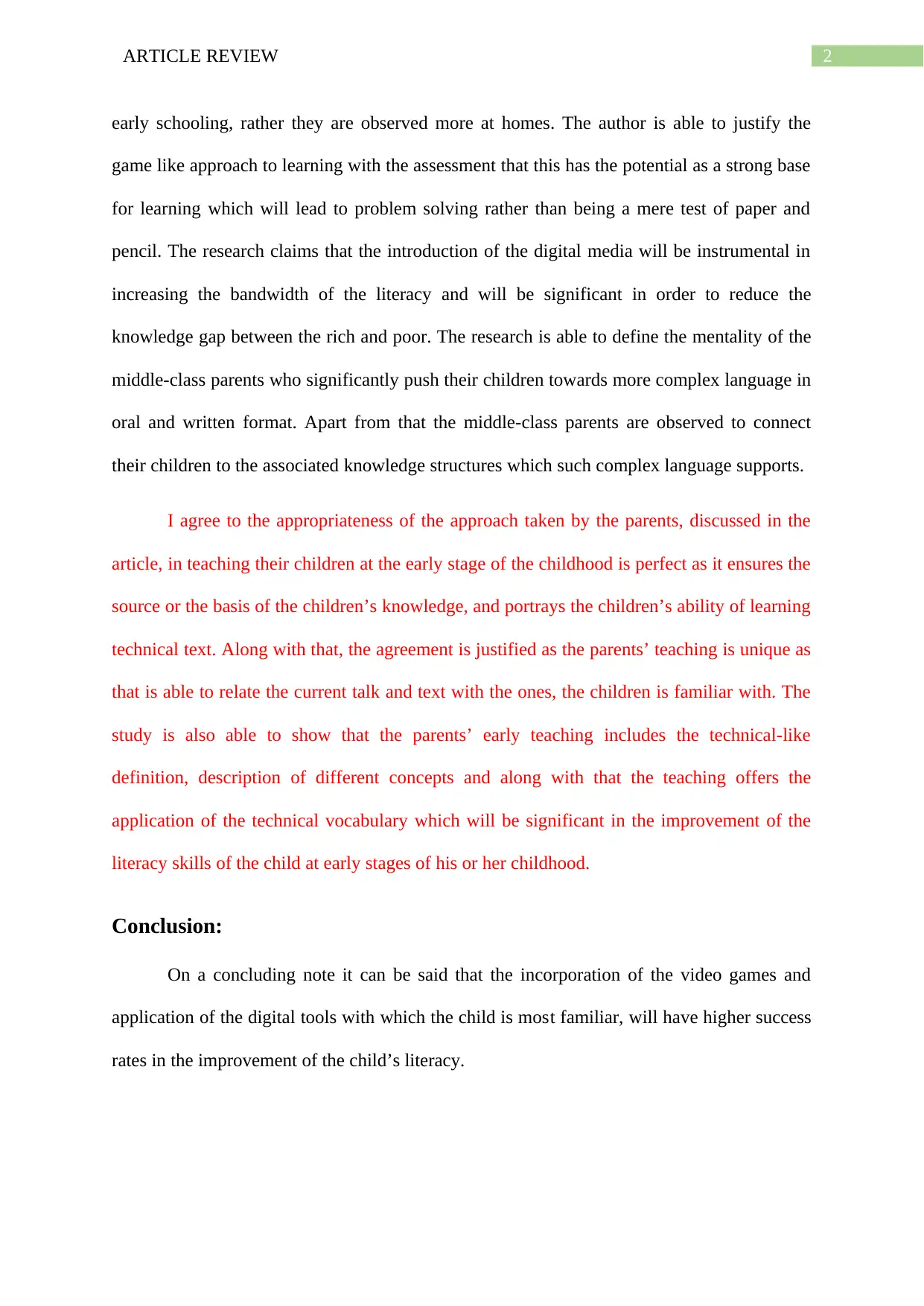CUUS443-17 Article Review: Literacy, Video Games, Popular Culture
VerifiedAdded on 2023/06/04
|4
|748
|165
Essay
AI Summary
This paper presents an article review focusing on the impact of video games and popular culture on literacy, particularly in early childhood education. It addresses the "fourth-grade slump," where children struggle to apply early reading skills to academic content. The review emphasizes the importance of preparing children for technical and academic language forms early on, advocating for "lucidly functional language practices" and informal lessons. The author agrees with the article's assessment of game-based learning as a foundation for problem-solving and sees digital media as a tool to bridge the knowledge gap. It concludes that incorporating familiar digital tools, like video games, can improve a child’s literacy skills.

Running head: ARTICLE REVIEW
Article Review
Name of the Student
Name of the University
Author Note
Article Review
Name of the Student
Name of the University
Author Note
Paraphrase This Document
Need a fresh take? Get an instant paraphrase of this document with our AI Paraphraser

1ARTICLE REVIEW
Introduction:
The learning of the children at very primary stage of the childhood is a matter of
concern for every parents. The parents are observed to incorporate the basic learning of the
language to their children and the attempt is usually executed by the parents themselves. In
the modern generation, the competition is so high that the learning process of the children is
usually initiated at very early stage of their childhood and in order to prepare the children for
the school, the parents take significant part in the children’s early learning. The paper
evaluates the impact of a research which is able to connect the primary learning, learning
from the video games along with their literacy.
Discussion:
The paper is able to define the concept of the fourth-grade slump which is portrayed
as a phenomenon where the children learns enough to pass the early reading tests but fails to
read in school in order to learn the academic content. This specifies the ability to simply
decode and literal comprehension as the result of such early stage learning. Whereas the
study confirms that the goal of such early stage learning should have been the generation of
an ability which could handle increased amount of complex language in cases of the content
areas like science and math. The paper discusses that if a child is not subjected to a pattern of
study such as the fourth-grade slump, then the process of learning how to read is in need to
include preparation at a very early stage for the technical, academic and specialist forms of
the language and the forms are advised to be present in speech and writing in a justified
manner. The paper is able to rightfully mention the “lucidly functional language practices”,
“informal specialist language lessons” and the practices that simplifies the “situated
meanings” as the foundation of effective early preparation for the above mentioned forms of
the language. The study also acknowledges that these sort of practices are observed less in
Introduction:
The learning of the children at very primary stage of the childhood is a matter of
concern for every parents. The parents are observed to incorporate the basic learning of the
language to their children and the attempt is usually executed by the parents themselves. In
the modern generation, the competition is so high that the learning process of the children is
usually initiated at very early stage of their childhood and in order to prepare the children for
the school, the parents take significant part in the children’s early learning. The paper
evaluates the impact of a research which is able to connect the primary learning, learning
from the video games along with their literacy.
Discussion:
The paper is able to define the concept of the fourth-grade slump which is portrayed
as a phenomenon where the children learns enough to pass the early reading tests but fails to
read in school in order to learn the academic content. This specifies the ability to simply
decode and literal comprehension as the result of such early stage learning. Whereas the
study confirms that the goal of such early stage learning should have been the generation of
an ability which could handle increased amount of complex language in cases of the content
areas like science and math. The paper discusses that if a child is not subjected to a pattern of
study such as the fourth-grade slump, then the process of learning how to read is in need to
include preparation at a very early stage for the technical, academic and specialist forms of
the language and the forms are advised to be present in speech and writing in a justified
manner. The paper is able to rightfully mention the “lucidly functional language practices”,
“informal specialist language lessons” and the practices that simplifies the “situated
meanings” as the foundation of effective early preparation for the above mentioned forms of
the language. The study also acknowledges that these sort of practices are observed less in

2ARTICLE REVIEW
early schooling, rather they are observed more at homes. The author is able to justify the
game like approach to learning with the assessment that this has the potential as a strong base
for learning which will lead to problem solving rather than being a mere test of paper and
pencil. The research claims that the introduction of the digital media will be instrumental in
increasing the bandwidth of the literacy and will be significant in order to reduce the
knowledge gap between the rich and poor. The research is able to define the mentality of the
middle-class parents who significantly push their children towards more complex language in
oral and written format. Apart from that the middle-class parents are observed to connect
their children to the associated knowledge structures which such complex language supports.
I agree to the appropriateness of the approach taken by the parents, discussed in the
article, in teaching their children at the early stage of the childhood is perfect as it ensures the
source or the basis of the children’s knowledge, and portrays the children’s ability of learning
technical text. Along with that, the agreement is justified as the parents’ teaching is unique as
that is able to relate the current talk and text with the ones, the children is familiar with. The
study is also able to show that the parents’ early teaching includes the technical-like
definition, description of different concepts and along with that the teaching offers the
application of the technical vocabulary which will be significant in the improvement of the
literacy skills of the child at early stages of his or her childhood.
Conclusion:
On a concluding note it can be said that the incorporation of the video games and
application of the digital tools with which the child is most familiar, will have higher success
rates in the improvement of the child’s literacy.
early schooling, rather they are observed more at homes. The author is able to justify the
game like approach to learning with the assessment that this has the potential as a strong base
for learning which will lead to problem solving rather than being a mere test of paper and
pencil. The research claims that the introduction of the digital media will be instrumental in
increasing the bandwidth of the literacy and will be significant in order to reduce the
knowledge gap between the rich and poor. The research is able to define the mentality of the
middle-class parents who significantly push their children towards more complex language in
oral and written format. Apart from that the middle-class parents are observed to connect
their children to the associated knowledge structures which such complex language supports.
I agree to the appropriateness of the approach taken by the parents, discussed in the
article, in teaching their children at the early stage of the childhood is perfect as it ensures the
source or the basis of the children’s knowledge, and portrays the children’s ability of learning
technical text. Along with that, the agreement is justified as the parents’ teaching is unique as
that is able to relate the current talk and text with the ones, the children is familiar with. The
study is also able to show that the parents’ early teaching includes the technical-like
definition, description of different concepts and along with that the teaching offers the
application of the technical vocabulary which will be significant in the improvement of the
literacy skills of the child at early stages of his or her childhood.
Conclusion:
On a concluding note it can be said that the incorporation of the video games and
application of the digital tools with which the child is most familiar, will have higher success
rates in the improvement of the child’s literacy.
⊘ This is a preview!⊘
Do you want full access?
Subscribe today to unlock all pages.

Trusted by 1+ million students worldwide

3ARTICLE REVIEW
Bibliography:
Gee, J.P., 2009. Literacy, video games, and popular culture. The Cambridge handbook of
literacy, pp.313-325.
Bibliography:
Gee, J.P., 2009. Literacy, video games, and popular culture. The Cambridge handbook of
literacy, pp.313-325.
1 out of 4
Related Documents
Your All-in-One AI-Powered Toolkit for Academic Success.
+13062052269
info@desklib.com
Available 24*7 on WhatsApp / Email
![[object Object]](/_next/static/media/star-bottom.7253800d.svg)
Unlock your academic potential
Copyright © 2020–2026 A2Z Services. All Rights Reserved. Developed and managed by ZUCOL.





